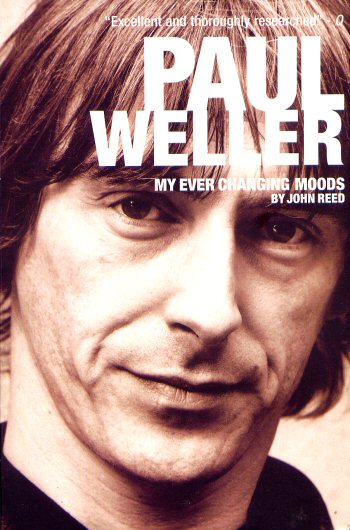I first read this book when it came out, around eight years ago. Having recently read the Andrew Collins biography of Billy Bragg - "Still Suitable For Miners" - which came out at much the same time, there were various points at which the two stories crossed, so I thought I would read the Reed book again, to hear the other side of those stories. However, whilst Collins spent around six months extensively interviewing Bragg, Reed wasn't able to. It seems that at the time that this was written, there was the possibility of an official biography, and as a result, the people who you really wanted to hear from were not available to be interviewed for Reed's book. Including Paul Weller himself. The cover of Reed's book says "... thoroughly researched", and it had to be, as it is made up mainly of quotes from other sources - interviews, books, magazines, fanzines and even the gossip columns of newspapers. Many times, I couldn't help reading a Weller quote from twenty years ago and wondering what he thought about the same situation now, but Reed wasn't able to ask him. Reed had indeed interviewed Weller in the past, but not in the context of "I'm about to write a book about you". The closest person to the Weller "camp" seemed to be Jam drummer Rick Buckler, whom Weller had not spoken to in the fifteen years prior to the book being written. As a result, the book could seem disjointed. For instance, Buckler's tales of life on the road in The Jam were not matched with anything similar in the Style Council days. Without being able to speak to anyone close to the man himself, or indeed the man, the story becomes a tale of his music career, rather than an exploration of the mind that steered it. We never find what's behind his "ever changing moods", as promised in the title. Major events in Weller's life - getting married, having two children and his marriage breaking up - total around four sentences in the book. It would have been nice to know - for instance - where the wedding was, who was his Best Man, did he have any "showbiz" mates there? Were the children named after anyone in particular? The answers may have given us a little more insight into the man himself. So whilst his music is well detailed, the book only scratches at the surface of the wall surrounding the mind that made it. I couldn't help feeling that some sentences could just have easily ended with the word "probably". To be fair to Reed, he seems to have written the book at the wrong time, when Paul Weller was more inclined to contribute to another book which never materialised. He could also - given the limited number of people still close to Weller who were prepared to comment - have turned the book into a hatchet job and highlighted the way that the Weller camp has treated some of the people who have worked with him in the past. But he didn't. Instead he concentrated on chronicling the work of a unique musician. It's just a shame that we never got to find out more about those "Ever Changing Moods". Perhaps another Style Council title would have been more appropriate - "Here's One That Got Away". |

